#PreCleared
Explore tagged Tumblr posts
Text

Spark Production Music Concept Design 1 https://spearheadsofgod.com/spark-production-music-concept-design-1/?feed_id=1189 Our latest production music release, "Spark," features a new cover design art concept that perfectly encapsulates its gritty, urban essence. The artwork reflects the raw energy and dynamism of the track, making it an ideal choice for films, TV, and media projects seeking a bold and edgy stock music option.
#ConceptDesigns#BroadcastMusic#CatalogTracks#CommercialUse#CopyrightFree#LibrarySound#LicensedAudio#MediaLicensed#MultiPurpose#MusicAssets#NonExclusive#OnDemandMusic#PreCleared#PreRecorded#ProductionMusic#ProductionThemes#ReadyToUse#RoyaltyFree#StockScores#StockTracks#SyncReady
0 notes
Text
flew back to the states yesterday and with all the time changes and my layover that meant yesterday was 35 hours long for me i am still so tired.. but the weather in dublin was so nice on my layover i was pleasantly surprised
#aer lingus ur flights will always be delayed. but at least the crew was super nice and helpful when my mom couldnt board because of#stupid US preclearance#the captain helped me contact my mom when she couldnt board by letting me use his personal hotspot and his phone was named#“You know you want it!” so silly and sweet
5 notes
·
View notes
Text
2025年1月日本預先通關&入境審查整合資訊亭導入,實現滑順入境日本,並率先對台灣實施"預先通關服務"的「預先通關&入境審查整合」全指南!
#巡日#旅行#出國#台灣機場#入境審查整合#預先通關#世界博覽會#大阪關西世博#日本機場#巡日指南#巡日旅行攝#Japan#Travel#事前クリアランス#Preclearance#にほんこく#Guide#Tips#RoundtripJp
1 note
·
View note
Text
Etihad’s US Preclearance in Abu Dhabi Shifting to New Terminal
Etihad Airways will shift the US preclearance in Abu Dhabi to the new terminal from September Know more about its preclearance facility at Zayed International Airport here
0 notes
Text
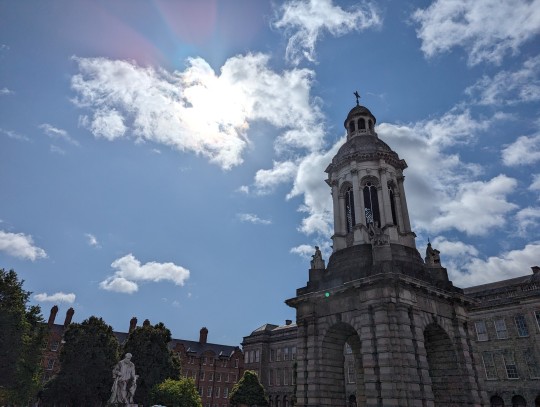


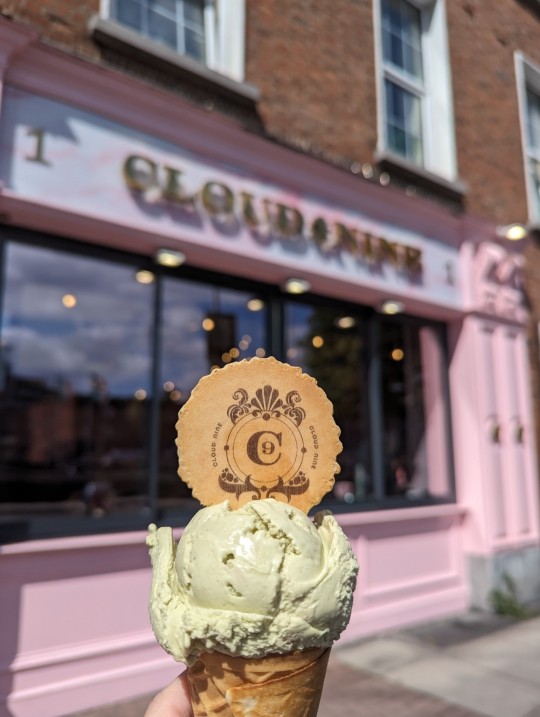
dublin yesterday 🫡🫠
1 note
·
View note
Text
Fansub Release + Analysis of Utena Ep 14
This is a big one!!

My fansub release posts aren't usually like this, but this episode is so jam packed with stuff I want to talk about that I had to write my translation notes as a series of essays. It's longer than usual so strap in!
First, a word on “The Mikage Seminar”
I’ve always found the translation “the Mikage Seminar” very strange. In English, a seminar is an event — a lecture. Yet “the Mikage Seminar” is discussed as though it’s not a recurring lecture, but a society or a school of therapy, or a cult (like scientology). In fact I did a bit of reading about scientology to try and find an alternative translation, and discovered that the origins of scientology, namely a set of ideas and practices called Dianetics, bears a lot of similarities to “the Mikage Seminar”. Both involve a type of therapy where one person looks into their mind and talks to an “auditor”.
The auditor coaxes the preclear to recall as much as possible. — Wikipedia
This in particular stood out to me! Mikage often says 「深く。もっと深く」 during his interviews (”Deeper. Dig deeper.”).
The Japanese word ゼミナール doesn’t actually come from the English “seminar” but the German “Seminar” (capitalised). According to Wikipedia, in Germany, and often in Japan, Seminar/ゼミナール is used to refer to a university course that includes a thesis project. So ゼミナール refers to a course of learning, rather than a talk or lecture. And it would make a lot of sense to call a system like Dianetics a “course”. Almost like a “course” of medicine — a “course” of psychological practices that you can join but never complete.
So it would make sense to translate it as “the Mikage Course”. But “course” has more meanings in English than just this, and in the context of a university this makes it sound more like a mundane teaching course. So I tried some other words: the Mikage Sessions, the Mikage Method, Mikage Psychotherapy, Mikage Therapy, the Mikage Movement. None seemed quite right. Until I remembered this post. ゼミナール is a foreign word in Japanese, why not find a foreign word for the translation? And so I settled on this:
The Mikage Seminarium, AKA The Society of the Black Rose…
Seminarium is Latin, and is where both the German and English derive seminar from. Its original meaning is “seed plot”, but it’s also just the Polish word for seminar. I really like how the Latin makes its meaning ambiguous — it kind of sounds like a location, kind of sounds like a society, and kind of sounds like a learning course. Because it is all of these things.


Anthy: で���、香苗さん。失礼します。 Kanae: ね、あたしの事、お姉さんって呼んでいいのよ。もうすぐわたしはあなたの本当のお姉さんになるんだから。
A more literal translation:
Anthy: Thank you for having us, Kanae-san. Kanae: Please… you can just call me “sister”. I’m going to be your real sister soon enough anyway.
The translation I ended up going with:
Anthy: Thank you for having us, Miss Ohtori. Kanae: Please... you can just call me Kanae. We're going to be family soon. There's no need for the formalities.
Japanese honorifics strike again!
In English, sisters-in-law don’t ask to be called “sister”. That would be super weird in most scenarios, and this scene is trying to evoke a particular familiar feeling of closing a distance gap in a relationship. The audience is meant to relate. Changing how Anthy addresses Kanae was pivotal to this scene working properly.


わかりました。あなたは世界を革命するしかないでしょ。
I understand. Your only choice is to force the world to change around you.
This line is translated as “Your only choice is to revolutionise the world” by basically every other translation. The reason is clear — the Japanese is the same as when Utena pulls the sword out of Anthy, or when any of the other characters talk about “revolutionising the world”. However, in this context, I don’t like it. The nuance of the English phrase is quite different to the Japanese phrase. In English, it’s often used to describe new commercial products: “This new device will revolutionise the world!” It comes with an implied “for the better”, but has used to describe technological developments so unexciting that it can also feel hollow. When the student council talk of revolutionising the world, they sound like revolutionaries — the context makes it work. But in this context, it comes out of nowhere and doesn’t have any of that fervour, which makes it sound hollow and flaccid when it should sound sinister and manipulative.
I think a pervading throughline for all the Black Rose duelists is that they see their problems as caused by other people, with themselves being blameless. Rather than change how they approach their situation, Mikage tells them they’re in the right.
Your behaviour will set you down a path. If that path leads to your goals, well done! However, if your path does not lead to your goals, there’s only two ways you can achieve them.

The first is to change your behaviour so that it does align with your goals. The second, impossible way, is for the rest of the world to change such that your current path DOES end up leading to your goals. This second way is not possible in the real world. But it is possible in Utena.

Also I’ll just leave this here: “around you” → “revolve” → “revolution” 👀
Kanae tried to build a relationship with Anthy in a passive, non-confrontational, extremely Japanese way — the way she has been taught to behave, the “proper” way, a mechanical following of the social scripts. We don’t see a lot of their relationship, but the way she behaved and spoke of behaving towards Anthy is very very similar to the way my Japanese grandmother has behaved towards my and my brother’s partners.
It was unthinkable to her to change this pattern of behaviour. Her only choice was to change Anthy, change the rest of the world, so that her behaviour would lead to the outcomes she wants. You could describe this forceful bending of reality to be “revolutionising the world”.


この黒薔薇のある限り、私はこれから嘘の私を演じなくて住む。
As long as I have this Black Rose, I'm free from the lie I was living before.
Besides gender, growing up, and resisting change (which exist as separate themes but also all intertwine as one), another major theme present in Utena is the self and subjective reality. The self is explored within those first major three themes, but also in terms of how the self dictates reality with the Black Rose duellists.
Black Rose Kanae says that her past self was a lie.
It reminds me of all the times when I’ve been going through a personal trial and I’ve looked back on my past self and thought “How naive I was. I understand things better now.” And then after a while I realise I was wrong, and my first self was more right. And then later still, maybe I re-realise that the second self was more right! And so on! The reality of truth (or to use Kanae’s language, “lies”) is so subjective.
Who dictates knowledge production? Who decides what is true; what is valid knowledge? This is a question of sociology - and at the moment that answer is "science does, kinda". But science and academic systems are supported by capitalist structures and tainted by capitalistic incentives — needing to be published in a journal, issues of replicability, the barrier to entry into academia in the first place, etc, etc. In the future we may find our current way of organising knowledge to be archaic and primitive in the same way we look back at medieval scholars.
But what about organising self-knowledge? Knowledge where the only one who can really decide what is true is yourself. And the only one that can decide what yourself even IS is yourself. I feel like I have looked back on my old ways of conceptualising myself many times (not even counting the gender-based revelations) and thought it primitive and archaic, and NOW I truly understand who I am and how to think of myself and how my thoughts interact with my other thoughts. But I have no doubt that I’ll look back on this current self of mine and reject their way of thinking too.
After their heart is replaced by the Black Rose, the duellists themselves frame this change as a moment of self realisation, of clarity. Once the rose is inside them, they wake up from themselves, like I have countless times. Kanae says herself, “This is the true me.” Honestly, I don’t doubt it. I think that version of Kanae was her true self at that moment, given the things influencing her. Being brainwashed doesn’t make you less of a person, or less yourself. It just makes you organise your reality differently.


心を凍結させて作っただけの間に合わせのデュエリストでは、彼女は破れないな。
We won't be able to defeat her by simply freezing someone's heart and forcing them to duel.
Anya and I discussed this in depth. I originally translated 心 as “mind”, because that was the first thing that popped into my head and I thought that was the simple part of the translation. However, Anya pointed out that it didn’t make sense with the themes of self and subjective reality, and I strongly agreed, so I changed it to “heart” instead.
Anya suggested “conscious mind” instead of “heart” but I think heart is more accurate. 心 (kokoro) can mean heart or mind in Japanese (I find it interesting that those two things are portrayed as opposites in English), and that kanji is found in the word for biological heart, 心臓 (shinzou). When they say of the Black Rose "This is your new heart" they use 心臓. They also say "Your new 命 (life/lifeforce)" which I translated as soul since it sounded more hardcore and because "your new life" is a set phrase in English meaning a new chapter in your life rather than your life force. I think the idea is that they're freezing the duellists' ability to love and feel empathy, which in my opinion is necessary for them to commit to the unbelievably selfish act of revolutionising/reconstructing/bending the entire structure of the world for their own convenience.

A very special thanks to @dontbe-lasanya for being there to talk through all these themes and ideas. I'm incredibly proud of this episode's translation and I wouldn't have been able to do it without them.
If you want to see more analysis like this, let me know! And also follow this blog to see episodes of the fansub as they're released. You can find all episodes released so far here:
Rose divider taken from this post
#revolutionary girl utena#rgu#shoujo kakumei utena#sku#utena#media analysis#utena analysis#translation#japanese#japanese language#langblr#official blog post#utena fansub
183 notes
·
View notes
Text
Karen Moment #2: Dublin Airport, you are HUGE. WHY is there literally no food options in the American flights side of the terminal?
Does going through security at the airport ever get easier? There was nowhere to take out my liquids/laptop/etc. until I was literally standing right in front of the TSA line this morning and I almost had an anxiety attack.
#We got a WH Smith right by my gate and that's it. Bruh.#God I cannot wait to get back home but also TERRIFIED...#Also I stressed over the US Preclearance and the lady asked me literally TWO questions. It took 30 seconds LMAOOO
16 notes
·
View notes
Quote
Democrats have tried since 2021 to pass a voting rights act but have been stymied by Republicans, who oppose such protections. On March 5, 2025, Representative Terri Sewall (D-AL) reintroduced the John R. Lewis Voting Rights Advancement Act, which would help restore the terms of the Voting Rights Act, and make preclearance national. The measure is named after John Lewis, the Student Nonviolent Coordinating Committee leader whose skull law enforcement officers fractured on the Edmund Pettus Bridge. Lewis went on from his days in the Civil Rights Movement to serve 17 terms as a representative from Georgia. Until he died in 2020, Lewis bore the scars of March 7, 1965: Bloody Sunday.
Heather Cox Richardson
18 notes
·
View notes
Text
"Two years ago, the biggest battles in state legislatures were over voting rights. Democrats loudly — and sometimes literally — protested as Republicans passed new voting restrictions in states like Georgia, Florida and Texas. This year, attention has shifted to other hot-button issues, but the fight over the franchise has continued. Republicans have enacted dozens of laws this year that will make it harder for some people to vote in future elections.
But this year, voting-rights advocates got some significant wins too: States — controlled by Democrats and Republicans — have enacted more than twice as many laws expanding voting rights as restricting them, although the most comprehensive voter-protection laws passed in blue states. In all, 39 states and Washington, D.C., have changed their election laws in some way this year...
Where voting rights were expanded in 2023 (so far)
Unlike two years ago, though, we’d argue that the bigger story of this year’s legislative sessions was all the ways states made it easier to vote. As of July 21, according to the Voting Rights Lab, [which runs an excellent and completely comprehensive tracker of election-related bills], 834 bills had been introduced so far this year expanding voting rights, and 64 had been enacted. What’s more, these laws are passing in states of all hues.
Democratic-controlled jurisdictions (Connecticut, the District of Columbia, Hawaii, Maryland, Maine, Michigan, Minnesota, New Mexico, New York, Rhode Island and Washington) enacted 33 of these new laws containing voting-rights expansions, but Republican-controlled states (Alabama, Arkansas, Idaho, Louisiana, Mississippi, Montana, North Dakota, Oklahoma, Tennessee, Texas, Utah, West Virginia and Wyoming) were responsible for 23 of them. The remaining eight became law in states where the two parties share power (Nevada, Pennsylvania and Virginia).
That said, not all election laws are created equal, and the most comprehensive expansive laws passed in blue states. For example:
New Mexico adopted a major voting-rights package that will automatically register New Mexicans to vote when they interact with the state’s Motor Vehicle Division, allow voters to request absentee ballots for all future elections without the need to reapply each time and restore the right to vote to felons who are on probation or parole. The law also allows Native Americans to register to vote and receive ballots at official tribal buildings and makes it easier for Native American officials to get polling places set up in pueblos and on tribal land.
Minnesota followed suit with a law also establishing automatic voter registration and a permanent absentee-voting list. The act allows 16- and 17-year-olds to preregister to vote too. Meanwhile, a separate new law also reenfranchises felons on probation or parole.
Michigan enacted eight laws implementing a constitutional amendment expanding voting rights that voters approved last year. Most notably, the laws guarantee at least nine days of in-person early voting and allow counties to offer as many as 29. The bills also allow voters to fix mistakes on their absentee-ballot envelopes so that their ballot can still count, track the status of their ballot online, and use student, military and tribal IDs as proof of identification.
Connecticut became the sixth state to enact a state-level voting-rights act, which bars municipalities from discriminating against minority groups in voting, requires them to provide language assistance to certain language minority groups and requires municipalities with a record of voter discrimination to get preclearance before changing their election laws. The Nutmeg State also approved 14 days of early voting and put a constitutional amendment on the 2024 ballot that would legalize no-excuse absentee voting.
No matter its specific provisions, each of these election-law changes could impact how voters cast their ballots in future elections, including next year’s closely watched presidential race. There’s a good chance your state amended its election laws in some way this year, so make sure you double-check the latest rules in your state before the next time you vote."
-via FiveThirtyEight (via FutureCrunch), July 24, 2023
#voting rights#voting matters#united states#us politics#new mexico#Minnesota#Michigan#Connecticut#voting rights act#ballot box#civil rights#elections#election 2024#election law#constitutional amendments#felon voting#native american#first nations
207 notes
·
View notes
Text
7 notes
·
View notes
Text
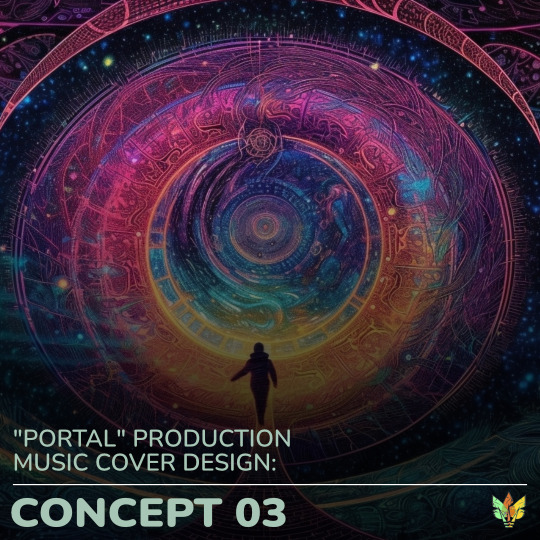
Portal Production Music Concept Design 3 https://spearheadsofgod.com/portal-production-music-concept-design-3/?feed_id=1125 Our new cover design art for the latest production music release titled "Portal" is a visual representation of the transformative power of music in films, TV, and media. Featuring a captivating design, the cover captures the essence of this stock music collection, designed to transport audiences to new dimensions of sound and emotion.
#ConceptDesigns#BroadcastMusic#CatalogTracks#CommercialUse#CopyrightFree#LibrarySound#LicensedAudio#MediaLicensed#MultiPurpose#MusicAssets#NonExclusive#OnDemandMusic#PreCleared#PreRecorded#ProductionMusic#ProductionThemes#ReadyToUse#RoyaltyFree#StockScores#StockTracks#SyncReady
0 notes
Photo
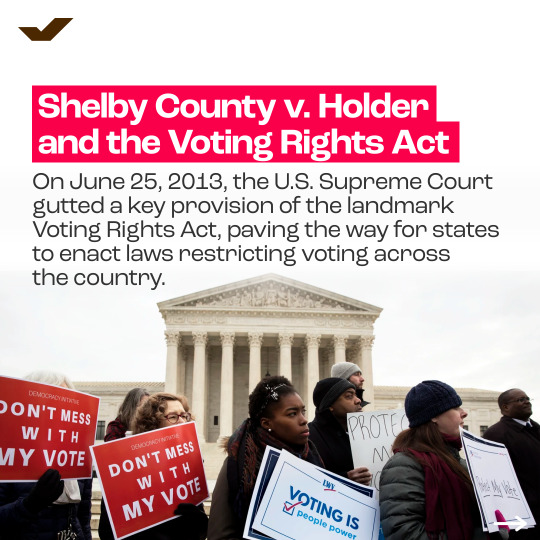
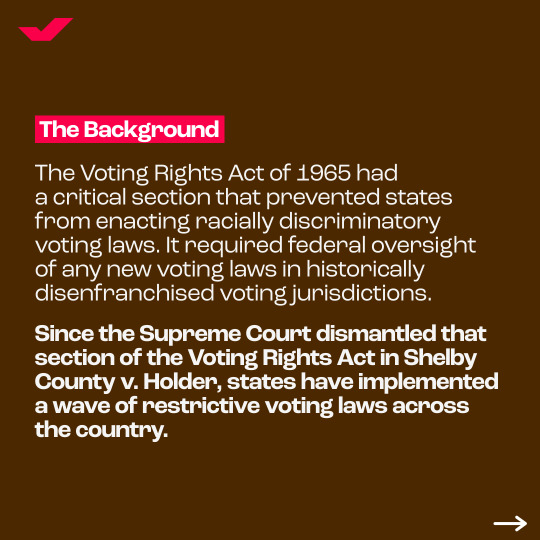
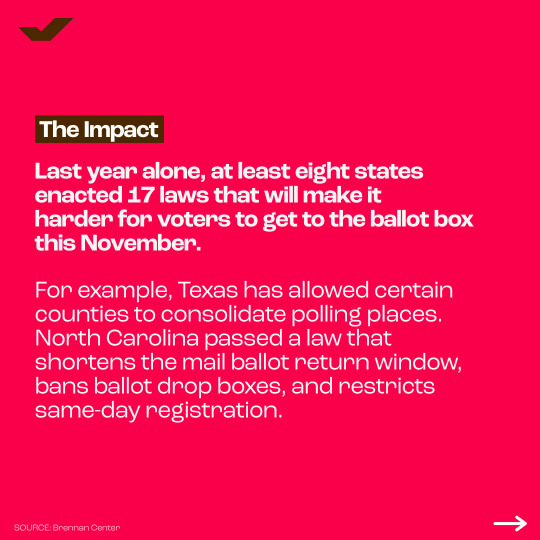
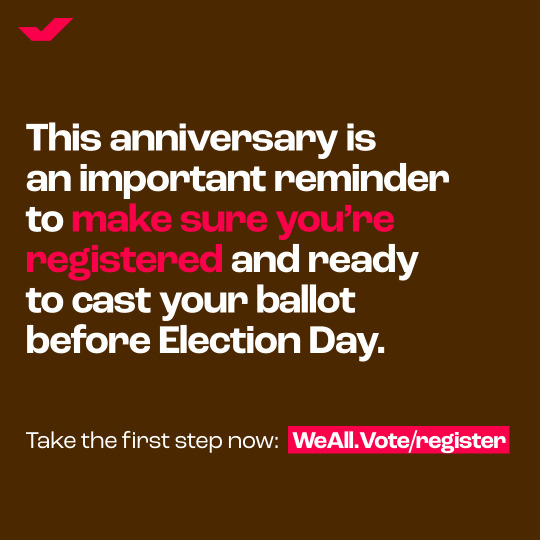
Barriers to the ballot box have increased significantly since the U.S. Supreme Court gutted a critical section of the Voting Rights Act with their Shelby County v. Holder ruling 11 years ago today.
In her dissenting opinion, Justice Ruth Bader Ginsburg wrote: “Throwing out preclearance when it has worked and is continuing to work to stop discriminatory changes is like throwing away your umbrella in a rainstorm because you are not getting wet.”
Consider today’s anniversary a reminder to check your voter registration at WeAll.Vote/register.
#voting rights#voting#voting rights act#supreme court#scotus#shelby county#RBG#voter registration#voters#vote
14 notes
·
View notes
Text
Civil Rights Watchdog under Assault by Trump Administration
Pushing Voting Rights Enforcement out of Justice Department Poses Risk to Democracy

One of the most effective and enduring institutions won by the Civil Rights Movement – the Civil Rights Division of the United States Department of Justice – is under assault.
The Trump administration is attempting to remake the department to serve its ideological agenda. Under the new head of the civil rights, Harmeet Dhillon, the division is shifting focus from defending the rights of marginalized groups to targeting what the administration describes as "woke ideology." In one particularly egregious early step towards that goal, the administration has removed senior civil servants working in the voting rights section. It also ordered attorneys to abandon voting rights cases.
Born from Black Americans’ struggle to end Jim Crow laws, the division has long served as a federal check against systemic discrimination at state and local levels. It enforces federal civil rights laws in the areas of housing, education, policing, employment, and voting to protect people from discrimination based on race, ethnicity, gender, disability, national origin, and other protected traits.
The Civil Rights Division once “precleared” changes to election laws in states with histories of discrimination to stop them from repeating past harms. It also participated in lawsuits to prevent and reverse laws that would infringe upon the right to vote.
Since January, attorneys in the Civil Rights Division have steadily resigned. The exodus accelerated last week with over 100 attorneys leaving because of the office’s shift in core priorities. Dhillon has said that those unwilling to align with the administration’s vision should leave.
2 notes
·
View notes
Text
Joan McCarter at Daily Kos:
A long-time national champion of abortion rights is on her way to the top of the Democratic ticket. And Vice President Kamala Harris will kick Donald Trump’s ass on the issue. Harris has been the abortion-rights lead in President Joe Biden’s administration, with a crystal clear message. [...] Harris has been fighting for abortion rights—and against the anti-abortion extremists—for her whole career. As California’s attorney general, she championed legislation cracking down on crisis pregnancy centers, forcing them to disclose that they weren’t licensed medical providers and requiring them to inform clients how they could receive abortion care. (Unfortunately, the Supreme Court struck that law down in 2018.) Harris also joined with other blue-state attorneys general regularly to champion reproductive rights in the courts.
She kept at it when she went to the U.S. Senate, in 2019, sponsoring a bold abortion-rights bill modeled on the Voting Rights Act. The bill would have forced states trying to implement harsh abortion restrictions to present their new laws to the Department of Justice for preclearance—i.e., approval from the federal government—before they could be implemented. Since the Trump-packed Supreme Court laid all those efforts to waste in 2022, ultimately ending the federal right to abortion, Harris became the leader in the fight to stop a national abortion ban and to help abortion-rights activists advance state-level protections. Harris has been the heart of the now-defunct Biden-Harris campaign’s abortion-rights fight, with a national tour that kicked off in January. She made history in March by becoming the first president or vice president to visit a clinic that provides abortion services.
As writer Jessica Valenti notes, Harris has been so effective as a “direct and enthusiastic” because she has walked the talk and is not afraid to frankly talk about the issue. She understands—and can communicate—it from a rights perspective and from a health perspective, in contrast to Biden, who evolved to a pro-abortion-rights position but has seemed uncomfortable even using the word “abortion.”
With Kamala Harris tapped as the de facto Democratic nominee and the 2024 Presidential election being the first post-Roe, Harris serves as a more effective messenger on abortion and reproductive health issues that are more in tune with the post-Roe era than Joe Biden would.
See Also:
The Guardian: Biggest US abortion rights groups back Kamala Harris as effective messenger
Abortion, Every Day: Harris/Abortion 2024
#2024 Elections#2024 Presidential Election#Kamala Harris#Abortion#Donald Trump#Reproductive Health#Reproductive Justice#Roe v. Wade#Dobbs v. Jackson Women's Health Organization
7 notes
·
View notes
Text
The guy at Preclearance in Dublin: “put your right hand on the machine, please.”
Me: *puts my left hand on the machine*
The customs guy: “That’s great. Now put your Irish right hand on the machine.”
#he was v nice#also joked about our fate (whether or not we get to enter the US) being only seconds away#but he also sounded really like trump which was unsettling
3 notes
·
View notes
